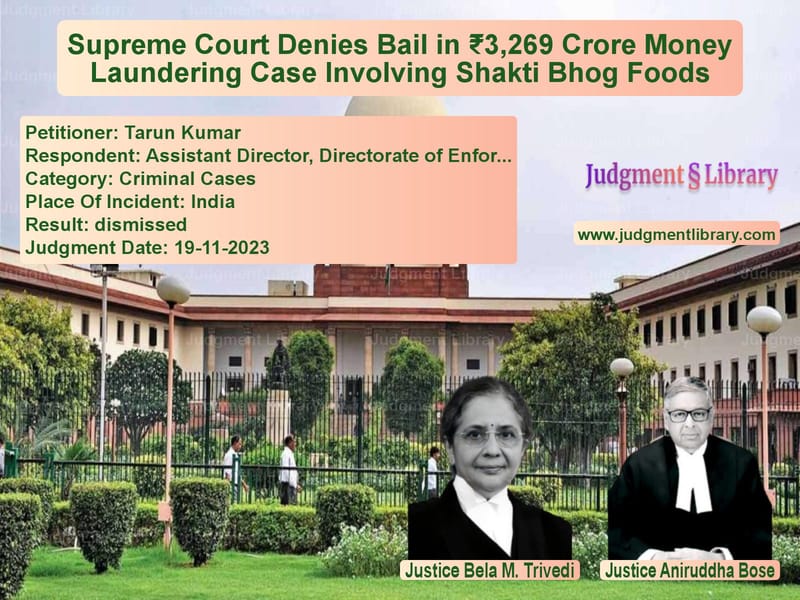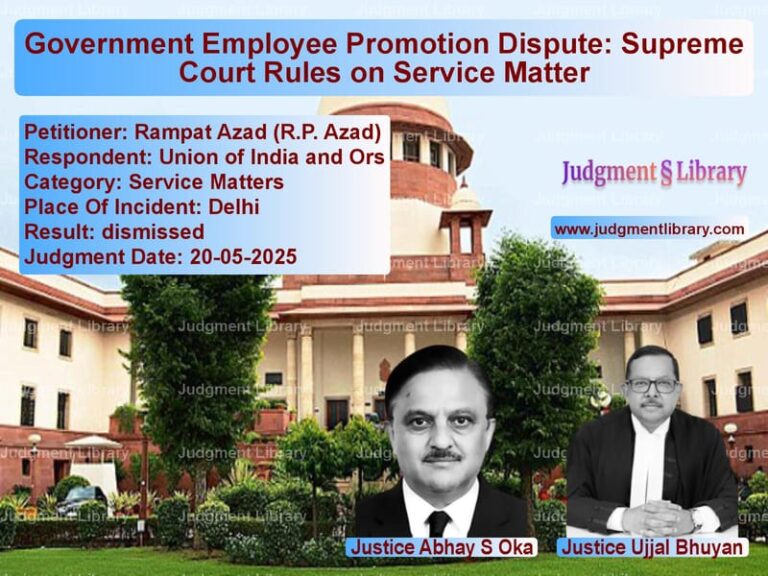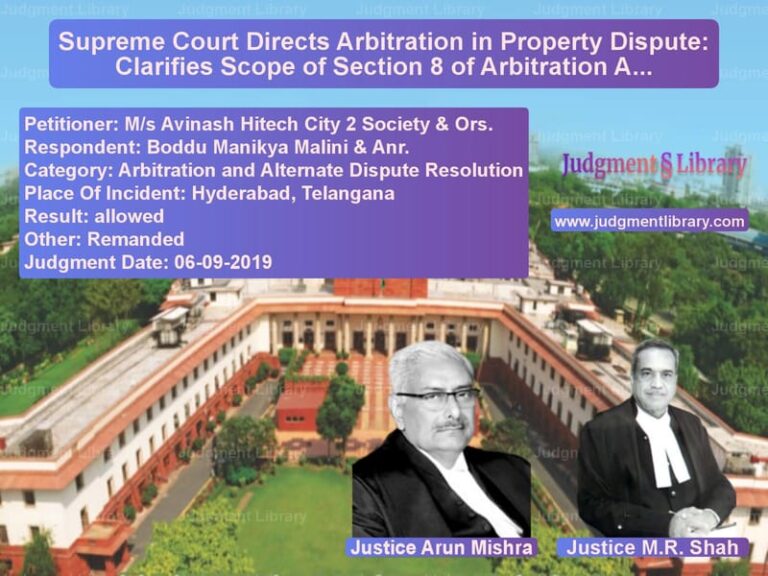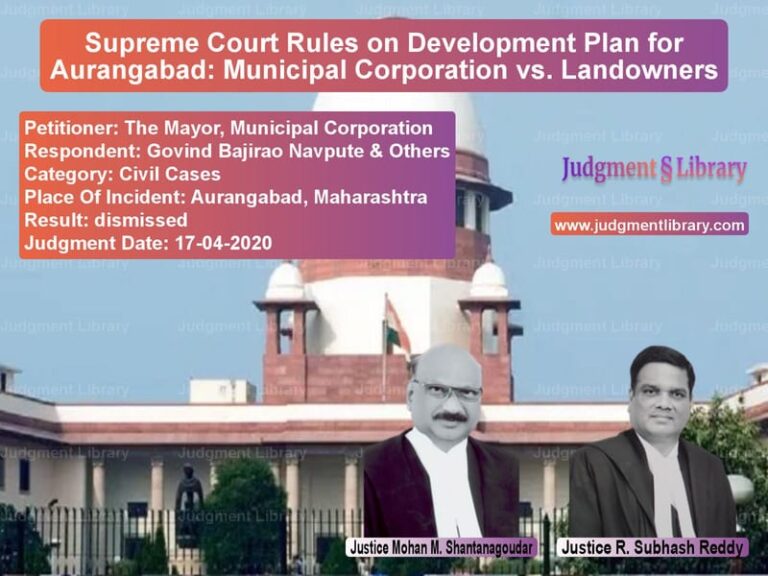Supreme Court Denies Bail in ₹3,269 Crore Money Laundering Case Involving Shakti Bhog Foods
The Supreme Court of India recently ruled in Tarun Kumar v. Assistant Director, Directorate of Enforcement, denying bail to the appellant in a high-profile ₹3,269 crore bank fraud and money laundering case. The case involves Shakti Bhog Foods Ltd. (SBFL), a company accused of defrauding a consortium of banks and engaging in financial misconduct. The judgment clarifies the stringent conditions under Section 45 of the Prevention of Money Laundering Act (PMLA), 2002, which govern bail in money laundering cases.
Background of the Case
The appellant, Tarun Kumar, was the Vice President (Purchases) at Shakti Bhog Foods Ltd. and a director in several of its group companies. He was arrested on June 22, 2022, in connection with the ongoing probe into financial irregularities. His name surfaced in the fourth supplementary complaint filed by the Directorate of Enforcement (ED) under the PMLA.
Key Allegations Against Shakti Bhog Foods Ltd.
- SBFL defaulted on loans amounting to ₹3,269.42 crores, leading to a forensic audit by BDO India LLP.
- The audit revealed financial irregularities and discrepancies in the company’s accounts from 2013 to 2017.
- The CBI registered an FIR on December 31, 2020, against the company’s directors, employees, and unknown persons under the Prevention of Corruption Act, 1988 and various sections of the Indian Penal Code (IPC), including Sections 420, 467, 468, and 471.
- The ED launched a parallel investigation under the PMLA on January 31, 2021.
Legal Issues Examined
- Whether the appellant fulfilled the twin conditions under Section 45 of PMLA for bail.
- Whether his role in financial fraud was sufficiently established to justify continued incarceration.
- Whether his prolonged detention violated the principles of fair trial and speedy justice.
Arguments by the Appellant (Tarun Kumar)
The appellant, represented by Senior Counsel Sidharth Luthra, made the following submissions:
- He was not named in the original FIR or the first three prosecution complaints.
- The co-accused, Raman Bhuraria, a statutory auditor, was granted bail by the Delhi High Court, and parity should be maintained.
- The investigation against him was complete, and further incarceration was unnecessary.
- Bail cannot be denied solely because the offense is economic in nature (citing Satender Kumar Antil v. CBI).
- ED failed to justify why other similarly placed individuals were not arrested.
Arguments by the Respondent (Directorate of Enforcement)
The Additional Solicitor General, S.V. Raju, opposed the bail plea, arguing:
- Tarun Kumar played a key role in fraudulently inflating stock values and transferring proceeds of crime.
- He procured fake invoices from shell companies to secure credit from banks.
- He was actively involved in the diversion, rotation, and siphoning of loan proceeds.
- His release could hamper the ongoing investigation and allow evidence tampering.
Supreme Court’s Analysis
1. Strict Bail Conditions Under PMLA
The Court reaffirmed that economic offenses must be treated seriously due to their impact on public funds. It cited Vijay Madanlal Choudhary v. Union of India, which upheld the constitutionality of Section 45 of PMLA.
“The conditions specified under Section 45 are mandatory. The Court must be satisfied that there are reasonable grounds for believing that the accused is not guilty and is not likely to commit an offense while on bail.”
2. Appellant’s Role in Money Laundering
The Court noted that Tarun Kumar:
- Transferred ₹3.69 crore in proceeds of crime through his company, Goal Securities Pvt. Ltd.
- Was actively involved in exporting goods and siphoning off money abroad.
- Helped create fake invoices for fraudulent transactions.
The Court ruled that the evidence against him was substantial and merited continued detention.
3. Denial of Parity in Bail
The Court rejected the argument that he should get bail on parity with co-accused, stating:
“Parity is not an absolute right. Bail must be considered based on the role and involvement of the accused.”
It distinguished Tarun Kumar’s role from that of other co-accused who had been granted bail due to medical conditions or different levels of involvement.
4. Need for Swift Trials in Economic Offenses
The Court acknowledged that trials must be concluded within a reasonable timeframe but ruled that:
“Economic offenses are complex and require extensive investigation. Mere delay in trial does not automatically entitle the accused to bail.”
It cited Y.S. Jagan Mohan Reddy v. CBI, which emphasized the need for a stringent approach to economic offenses.
Final Judgment
The Supreme Court ruled:
- Bail denied to Tarun Kumar under Section 45 of PMLA.
- Confirmed that there were reasonable grounds to believe in his guilt.
- Held that continued detention was necessary for fair investigation.
- Emphasized that economic offenses must be dealt with strictly.
Conclusion
This ruling sets an important precedent for:
- Ensuring stringent bail conditions for economic offenses.
- Distinguishing different levels of involvement in financial fraud.
- Strengthening enforcement against bank fraud and money laundering.
- Preventing the misuse of bail provisions in white-collar crimes.
By denying bail, the Supreme Court reinforced that economic offenses require heightened judicial scrutiny to protect public financial interests.
Petitioner Name: Tarun Kumar.Respondent Name: Assistant Director, Directorate of Enforcement.Judgment By: Justice Bela M. Trivedi, Justice Aniruddha Bose.Place Of Incident: India.Judgment Date: 19-11-2023.
Don’t miss out on the full details! Download the complete judgment in PDF format below and gain valuable insights instantly!
Download Judgment: tarun-kumar-vs-assistant-director,-supreme-court-of-india-judgment-dated-19-11-2023.pdf
Directly Download Judgment: Directly download this Judgment
See all petitions in Money Laundering Cases
See all petitions in Bankruptcy and Insolvency
See all petitions in Corporate Compliance
See all petitions in Fraud and Forgery
See all petitions in unfair trade practices
See all petitions in Judgment by Bela M. Trivedi
See all petitions in Judgment by Aniruddha Bose
See all petitions in dismissed
See all petitions in supreme court of India judgments November 2023
See all petitions in 2023 judgments
See all posts in Criminal Cases Category
See all allowed petitions in Criminal Cases Category
See all Dismissed petitions in Criminal Cases Category
See all partially allowed petitions in Criminal Cases Category







